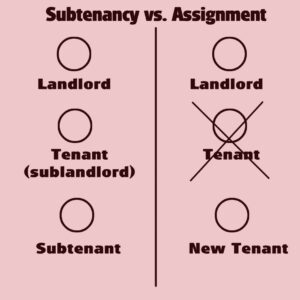 No. That was easy. But, as is usually true in Chicago landlording, there’s much more to the story. What is a sublease anyway? A sublease is merely a further leasing (by the tenant) of already leased property. When a tenant, for whatever reason, is unable to meet lease obligations, that tenant might seek to lease the unit to a tenant of their own- a subtenant. By doing so, the original tenant finds a new party to assist in meeting the lease obligations. The subtenant is simply the original tenant’s tenant. The original tenant becomes the sublandlord. The agreement, between the sublandlord and the subtenant is known as a sublease.
No. That was easy. But, as is usually true in Chicago landlording, there’s much more to the story. What is a sublease anyway? A sublease is merely a further leasing (by the tenant) of already leased property. When a tenant, for whatever reason, is unable to meet lease obligations, that tenant might seek to lease the unit to a tenant of their own- a subtenant. By doing so, the original tenant finds a new party to assist in meeting the lease obligations. The subtenant is simply the original tenant’s tenant. The original tenant becomes the sublandlord. The agreement, between the sublandlord and the subtenant is known as a sublease.
 A sublease is not a release of the original lease nor is it an assignment of the original lease. In a tenant release or an assignment, the original tenant gets “off the hook” for its lease obligations. In a subtenancy, the tenant remains liable to the landlord. The subtenant then steps into the shoes of the original tenant. The lease is not amended or modified. Instead, the subtenant merely takes on the obligation to fulfill the duties of the original tenant. The tenant actually steps into a new set of shoes – those of the landlord vis a vis the subtenant. As such, all of the provisions of the CRLTO apply to the sublandlord just like the original tenant was any other landlord in the City of Chicago. This means that, if the original tenant so chooses, the sublandlord collects a security deposit from the subtenant and holds it (pursuant to the conditions of 5-12-080). The original tenant’s deposit remains with the original landlord (the original landlord does not usually collect any deposit from the subtenant and, under a sublease, the landlord does not have to return the original tenant’s security deposit until the end of the rental term). The original tenant is still responsible if the subtenant breaches the lease. So where does the original landlord come into the picture? Unless the lease requires the landlord to accept all subtenants (that would be rare), the original landlord must consent to the sublease arrangement.
A sublease is not a release of the original lease nor is it an assignment of the original lease. In a tenant release or an assignment, the original tenant gets “off the hook” for its lease obligations. In a subtenancy, the tenant remains liable to the landlord. The subtenant then steps into the shoes of the original tenant. The lease is not amended or modified. Instead, the subtenant merely takes on the obligation to fulfill the duties of the original tenant. The tenant actually steps into a new set of shoes – those of the landlord vis a vis the subtenant. As such, all of the provisions of the CRLTO apply to the sublandlord just like the original tenant was any other landlord in the City of Chicago. This means that, if the original tenant so chooses, the sublandlord collects a security deposit from the subtenant and holds it (pursuant to the conditions of 5-12-080). The original tenant’s deposit remains with the original landlord (the original landlord does not usually collect any deposit from the subtenant and, under a sublease, the landlord does not have to return the original tenant’s security deposit until the end of the rental term). The original tenant is still responsible if the subtenant breaches the lease. So where does the original landlord come into the picture? Unless the lease requires the landlord to accept all subtenants (that would be rare), the original landlord must consent to the sublease arrangement.
Most landlords do not like subtenants. Sometimes it is because they did not choose them, sometimes it is because the landlord had other units for rent that could otherwise have been rented to the subtenant under a different lease, and sometimes it is just because a landlord does not want to be bothered by the complexity of a subtenancy.
Section 5-12-120 of the Chicago Residential Landlord Tenant Ordinance provides that a landlord must accept a reasonable sublease proposed by the tenant without an assessment of additional fees or charges. Let’s break this down. First, obviously, the tenancy must first be covered by the CRLTO (remember, exempt properties are listed in 5-12-020). Next, it is not the landlord’s job to find the subtenant. The law only says that the landlord must accept the subtenant proposed by the tenant. However, if the tenant does the legwork and finds a reasonable subtenant, then the landlord must accept the subtenant without any additional fees or charges. So must the landlord accept every possible renter that the tenant presents? No. The landlord must accept a “reasonable” subtenant. Basically this means that the landlord can evenly apply the same criteria to the subtenant that the landlord applies to all of the landlord’s other tenants. So, if the tenant presents a subtenant who has bad credit (worse than the landlord’s typical tenant) or past evictions, the landlord would probably be within the landlord’s rights to deny the subtenancy.
Sublease situations can be complex. Sometimes what seems like a subtenancy is actually an assignment, a release, or a new lease. Many landlords are confused about how to deal with security deposits, interest, and other practical matters when it comes to a sublease. In fact, sublease agreements need to be drafted, reviewed, and approved. If you are a landlord or a tenant, you might benefit from counsel by an experienced landlord tenant attorney. If that is the case, feel free to contact us or give us a call at 773-399-1122 and we can see if we might be a match for an engagement to assist you.

I am moving out of XXXXX and have found a subleaser but was told to research sublease law. XXXXX in Glendale Heights (Dupage) is requesting a 350 sublease fee but from what I am seeing, they are not allowed to ask for this. I don’t want to pay money that I am not required to pay by law. You can contact me also at my work email:
xxxx@xxxx
I am signing over the sublease thing in a few days, please get back to me if this is the case.
I’m not sure why you think that a sublease fee is not applicable. Does the lease or local law prohibit it? The CRLTO has provisions that specifically prohibit fees to sublease, but many (most) municipalities do not. Without seeing your lease and knowing your facts, I can’t provide legal advice and, we generally do not represent tenants except in security deposit recovery cases.